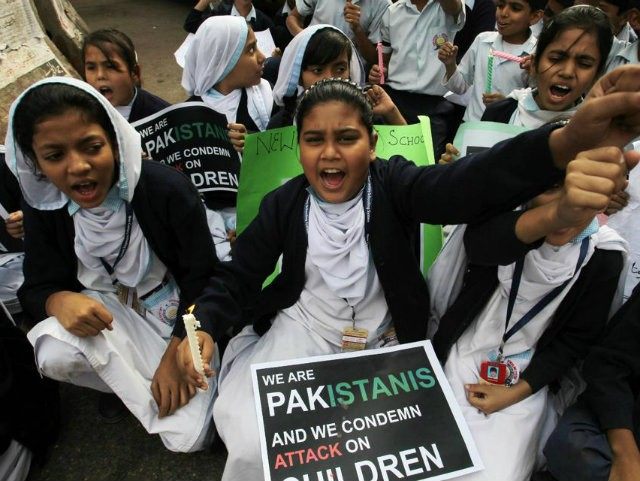This morning’s key headlines from GenerationalDynamics.com
- Terrorists attack school, part of growing violence in Karachi Pakistan
- Jordan’s King vows ‘relentless’ war on ISIS ‘on their own ground’
- The European Central Bank turns the screws on Greece’s banks
Terrorists attack school, part of growing violence in Karachi Pakistan

Warning letter left by terrorists after bombing Karachi school on Tuesday
Seven terrorists riding motorcycles hurled hand grenades at a school in the port city of Karachi in Pakistan. The school was damaged, but there were no casualties. Before leaving, the terrorists left a threat letter (shown above) saying that this attack was only a beginning, and that “the flames of war WILL intensify and engulf your homes!”
The attack was emblematic of the daily violence that occurs in Karachi, making it possibly the most dangerous megacity in the world. The massive terror attack on a Shia mosque that I reported on a couple of days ago took place in a Karachi suburb. There were at least 1,135 fatalities in 2014 from terror attacks in Karachi. Although many of them could be classified as ordinary gang warfare, many of the attacks are also sectarian in nature. Pakistan’s government has repeatedly promised to fight terrorism, but despite terrorist activity is increasing throughout Pakistan, authorities have done little.
Violence has been increasing in Karachi for decades, and is now approaching a crisis level that has the potential to transform into a secular war that engulfs first the region, then the entire country. Express Tribune (Pakistan) and South Asia Terrorism Portal (SATP – India)
Jordan’s King vows ‘relentless’ war on ISIS ‘on their own ground’
In the aftermath of the video by the Islamic State of Iraq and Syria (IS or ISIS or ISIL) depicting the barbaric murder of Jordan’s pilot Muath al-Kaseasbeh, Jordan’s King Abdullah II has promised a “relentless” war:
We are waging this war to protect our faith, our values and human principles and our war for their sake will be relentless and will hit them in their own ground.
Two jihadists in Jordan’s jails, previously convicted and sentenced to death, were executed by hanging on Wednesday morning. However, the father of the murdered pilot, who belongs to a powerful tribe in Jordan that is close to the king, said that wasn’t enough:
I demand none of them amongst us be kept alive. I demand the revenge be greater than executing prisoners. I demand the ISIL organization be annihilated.
This murderous organization, made up of militants from all the world countries, is acting in barbaric ways, violating all the international laws, codes of ethics, and prisoners’ conventions. That is why I strongly demand the government to swiftly take revenge for the blood of Moaz and the dignity of our country.
Public opinion in Jordan, which last week seemed to favor withdrawing Jordan from the anti-ISIS coalition, now appears to have undergone a complete reversal. Al Jazeera and Reuters
The European Central Bank turns the screws on Greece’s banks
Greece’s new finance minister Yanis Varoufakis, part of the Syriza government of radical left-wing prime minister Alexis Tsipras, is telling anyone who will listen that Greece will not be meeting its austerity commitments that it made in return for receiving 240 billion euros of bailout money paid so far, and that it will inaugurate new spending programs.
With Greece on a collision course with Europe, the European Central Bank (ECB) has taken the first step to isolate Greece financially. As part of the previous bailout negotiations, the ECB had implemented a waiver that would allow Greek banks to borrow money from the ECB using Greek bonds as collateral, despite the fact that Greek bonds are “junk bonds” with little investment value. On Wednesday, the ECB announced that it was lifting that waiver, and so Greek’s banks may no longer use Greek bonds as collateral.
Greek banks are already in trouble. During December alone, 4.6 billion euros in deposits were withdrawn from Greek banks and deposited in banks in other countries. A full-scale bank run is feared.
There is another way that Greece can borrow from the ECB, the Emergency Liquidity Assistance (ELA) program. The ELA is considerably more expensive, but it doesn’t require collateral. Kathimerini and ECB Press Release
KEYS: Generational Dynamics, Karachi, Pakistan, Jordan, King Abdullah II, Greece, European Central Bank, ECB, Yanis Varoufakis, Syriza, Alexis Tsipras, Emergency Liquidity Assistance, ELA
Permanent web link to this article
Receive daily World View columns by e-mail

COMMENTS
Please let us know if you're having issues with commenting.